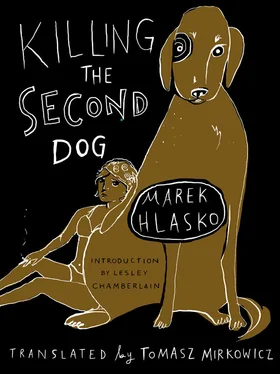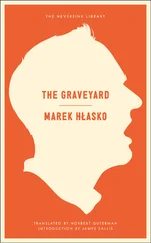Marek Hlasko
Killing the Second Dog
WHEN THE POLISH-BORN WRITER MAREK HLASKO’S FIRST SHORT novel was published in 1957 he seemed to spring from nowhere. The post-war order, particularly in communist Poland, was a painful and bewildering experience for the rising adult generation. Suddenly the gutsy, pared-down, and hardly optimistic narrative of his debut novel Eighth Day of the Week expressed what young people felt, and how they saw their defeated, deadbeat elders. Hlasko often hinted that he never meant to be a writer, and yet, from the other side of Europe, he fit Jean-Paul Sartre’s definition of contemporary style almost exactly. For the French philosopher the literary scene was now markedly under the influence of “the American writers, Kafka and Camus.” Hlasko wrote in this contemporary style seemingly without trying. How he found overnight success in Poland and then worldwide is a remarkable and tragic story.
He was born in Warsaw in 1934. His father was a lawyer and his mother had artistic leanings. They divorced when Hlasko was three and in 1939, just a couple of weeks into the Second World War, his father died. In Killing the Second Dog the protagonist calls his father gentle and good and notes that he was killed fighting the Germans. Perhaps we can take that as an indication. Certainly it’s the nearest to an autobiographical account we have. Hlasko’s mother ran a grocery stall in the capital during the Nazi occupation, but when the 1944 Warsaw Uprising failed, she and her son fled, along with thousands of others, to safer parts of the country. In his 1966 autobiography, Beautiful Twentysomethings , Marek remembered, aged ten, starting a new life in Czestochowa, southwest Poland. Shortly afterwards his mother remarried, and the family moved to Wroclaw, the nearest larger city. Thanks in part to his mother urging the poets upon him, the boy excelled in composition, but otherwise his school career was stormy. Several times expelled for aggressive behavior, he had his first taste of manual work at age thirteen. At sixteen he was a truck driver, an experience which formed the basis for a hair-raising account of real working conditions under post-war communism, Next Stop Paradise , written some years later.
A brief return to formal education was formative. In Wroclaw around the age of fifteen Hlasko attended the Vocational Theater School. Courses intended to turn out back-stage professionals introduced him to dramatic writing, and gave him contact with film and filmmakers. He began to read, not least the great playwrights, and to write. Meanwhile on the strength of his laboring background in 1951 the Communist Party newspaper Tribuna Ludu hired him as a “people’s reporter.” The task in communist days for all writers was to deliver a glowing account of working-class valor and virtue, but when Hlasko’s first stories appeared in 1954 they portrayed disillusioned, drink-sodden, malicious lives. Here was a world in which youthful idealism was soon shattered. After Soviet dictator Joseph Stalin died in 1953, the whole East Bloc heaved a sigh of relief that the bitter truths of everyday life could once again be told, although the message took a while to filter through to cautious cultural bureaucrats. When in 1956 the new Soviet Communist Party leader Nikita Khrushchev openly denounced his predecessor, that was the first intentional signal of a great easing-up. Hlasko’s debut collection of stories First Step in the Clouds appeared. And yet, by 1957, when that collection won the prestigious Publishers’ Prize, the ideological chill was back. The frankness of Eighth Day of the Week became was an embarrassment and work on turning it into a film was abruptly curtailed, pending radical changes.
Perhaps no writer from those times in any East Bloc country has left such a detailed account, in his autobiography and scattered through Killing the Second Dog , of what that swift change in 1957-58 meant to a young writer who was lionized and ostracized in quick succession. Hlasko’s headstrong and vulnerable character, and a proud belief in his work, put him on a collision course from which he was never able to recover.
When a decade later Hlasko’s work began to appear in English, foreign critics pounced on a writer who with his matinee good looks resembled James Dean’s Rebel Without a Cause and sounded like one of Britain’s Angry Young Men, impatient with lack of opportunity in a stultified class society after the war. But because of what he had witnessed under the Nazi occupation, and what communism brought to Poland, Hlasko was a rebel, and a writer, of quite a different order, one whom non-Polish readers perhaps can only begin to understand with hindsight.
The ideological upheaval of 1958 meant that Poland’s submission at the Cannes Film Festival was canceled. It was to have been the film version of The Eighth Day . While a toned-down version eventually materialized, Hlasko was bitterly disappointed. Meanwhile Polish publishers rejected his two latest fictions, Next Stop Paradise and The Graveyard . A state-sponsored writers’ visit to France, intended to make Polish names better known in the West, did go ahead, and Hlasko took part, with, amongst others, the poet and future Nobel laureate Wislawa Szymborska. But quietly at this point the state seems to have decided to cut its ties with Hlasko. He was allowed to leave the country, but without the funds he needed to live on in Paris. In those Cold War days when an official patriotism was required of every citizen, Poland had a reason for not wanting back this novelist who wrote of life there as grim and cheap. When he secured a French publisher for his rejected titles he gave them an even better one, in those crazily ideological days: an apparent lack of patriotism.
Hlasko decided to put a positive spin on his precarious situation by visiting America, but with his passport about to run out he didn’t qualify for a visa. Three years followed in which the communist Polish state played cat and mouse with the young man’s deep emotional need to return home. They make heartrending reading in Beautiful Twentysomethings and again in Killing the Second Dog .
The unrenewed passport, exchanged for the papers of a refugee, allowed Hlasko to travel in France, West Germany and Italy. In 1959 he married the German actress Sonia Ziemann who had played the female lead in Eighth Day of the Week , and they lived for a time in Munich. Photographs of that marriage — and images are all we have to go on — show an attractive happy couple. Sonia liked to drive fast and Marek obliged with the car she bought him. But later in 1959 Hlasko was already alone in Israel, ostensibly invited by friends, actually looking, illegally, for work.
In Israel he hoped those friends could help him. Polish Jews who had fled anti-Semitism, German Jews who had survived the war, and Jews already born in Israel, were now his compatriots and his “family.” In All Backs Were Turned , set in 1961, at a time when in Europe the Berlin Wall was going up, and in Killing the Second Dog , Hlasko would vividly evoke the tough, brazen, deeply unfriendly Israeli milieu in which he found himself. In staggering heat he was forced for a while to work in a blast furnace. When his wife came to find him someone stole the razor and towel that were his only possessions, as he turned his attention away from his place on the beach. The style of his Israeli novels, written between 1961 and 1966, seemed to combine hardboiled American crime with biblical simplicity. Killing mentions St. Paul and Mickey Spillane almost in the same breath. Perhaps Hlasko felt some affinity with a persecuted people starting afresh in a new homeland. The condition of a relatively new Israel was a replica on a grand scale of his own disturbed life. But he made clear his feeling that so many millions, not only Jews, had suffered. In the four short novels and several short stories he set in Israel it was not hope for one people, but the impossibility of human goodness as such, which obsessed him.
Читать дальше












